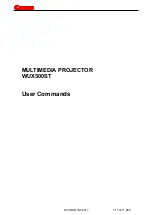
56
Viewing Stereoscopic 3D Images
Precautions on Viewing Stereoscopic 3D Images
Before viewing stereoscopic 3D images, please read this section carefully.
WARNING
Under normal conditions, viewing stereoscopic 3D images is safe for any duration that you
would normally view your screen. However, some people may experience discomfort. The
following precautions are recommended to minimize the potential for experiencing visual
problems or any adverse symptoms.
Take regular breaks, at least 5 to 15 minutes after every 30 to 60 minutes of stereoscopic 3D
viewing.
* Based on the guidelines issued by the 3D Consortium revised December 10, 2008.
Maintain an appropriate distance from the screen. Viewing from too close a distance can
strain your eyes. If you experience eye strain, immediately discontinue viewing.
If you experience any of the following symptoms during viewing:
– nausea
– queasiness/dizziness
– headache
– blurry vision or double vision that lasts longer than few seconds
Do not engage in any potentially hazardous activity (for example, driving a vehicle) until your
symptoms have completely gone away. If symptoms persist, discontinue use and do not
resume stereoscopic 3D viewing without discussing your symptoms with a physician.
As you get more comfortable viewing stereoscopic 3D:
• Adjust the parallax on the 3D-video playback equipment. (You may not be able to adjust
the parallax on some models of equipment.)
• Adjust the projected image to the most comfortable viewing size by zooming.
(Projecting images on the smallest or largest screen size possible may eliminate the
stereoscopic effect and strain your eyes.)
• Use the DLP
®
Link™ Invert function to properly set the video for your left and right eyes.
(For details on using “DLP
®
Link™ Invert”, see the section on its operation in this operation
manual.)
■
■
■
•
Содержание Conference Series XG-PH80W-N
Страница 84: ......
















































